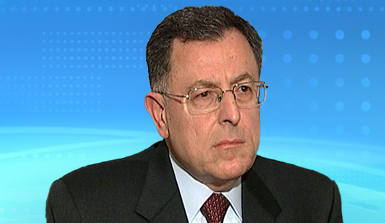 Former Prime Minister and current Future Movement parliamentary bloc leader MP Fouad Siniora said during a press conference that it is impossible to implement a proportional representation type electoral law in the presence of Hezbollah’s arms.
Former Prime Minister and current Future Movement parliamentary bloc leader MP Fouad Siniora said during a press conference that it is impossible to implement a proportional representation type electoral law in the presence of Hezbollah’s arms.
“It is impossible to implement proportionality in the presence of Hezbollah’s arms,” he was quoted as saying
Siniora , who held his press conference in Hlaliyyeh, Sidon was responding to the speech of Hezbollah chief Sayyed Hassan Nasrallah.
Siniora also reiterated his rejection of the so-called Orthodox Gathering proposal and said his bloc will soon present a comprehensive proposal that will ease the fears of the Christians and others and preserve coexistence.
“The bloc will soon make a comprehensive proposal that resolves the fears of Christians and others in a way that it preserves coexistence,” Siniora said.
Siniora stressed that elections should be held on time based on a law that keeps Lebanon away from dangers.
During his speech last Friday Nasrallah was quoted as saying:
“We had reservations initially about the proposed Orthodox electoral law and we in fact initially rejected it but our allies convinced us later and we now accept it.” He added:
“We prefer the law that was adopted by the cabinet . We also prefer the one electoral district for the whole country and we have accepted the law based on 13 districts even though this may not be to our advantage and may turn us to a minority ”.
The subcommittee charged with agreeing on an electoral has met several times to discuss the following proposed draft-laws:
Proportional Representation ( PR)
Lebanon’s Cabinet approved last August an electoral draft law which is referred to as the Charbel law ( in reference to Interior minister Marwan Charbel ) that called for proportional representation and divided the country into 13 districts as follows: Beirut 2, south Lebanon 2, Bekaa 3, north Lebanon 3 , Mount Lebanon 3.
The new electoral law was approved by the majority of ministers, including the Free Patriotic Movement Ministers (FPM) . However the 3 ministers that represent Progressive Socialist Party leader MP Walid Jumblatt’s bloc voted against it.
According to analysts Proportional representation has long been an objective of Shiite representatives, long before the formation of Hezbollah in the 1980s—and even before Amal’s in the 1970’s. Yet, support for PR has put the Shiite political parties at odds with others and specially the Christians and the Sunnis.
Orthodox Gathering
FPM MPs Alain Aoun and Neemtallah Abi Nasr submitted another draft electoral law to the parliament even though the FPM ministers voted for the PR system . This is the so called “Greek Orthodox gathering proposal” which calls on each sect in Lebanon to vote only for its candidate in the elections based on one electoral district for the whole country .
A Christian four-party panel on the electoral law agreed last Sunday to endorse the so-called Orthodox Gathering proposal
The panel took its decision during a meeting held in Bkirki. The four-party panel comprises representatives from the Free Patriotic Movement, the Lebanese Forces, the Phalange Party and the Marada Movement.
The Orthodox law was also criticized by President Michel Suleiman, Premier Najib Mikati, National Struggle Front leader Walid Jumblat and several other Christian MPs specially those belonging to the Greek Orthodox sect
Small districts
March 14 Christian MPs Georges Adwan, Boutros Harb and Sami Gemayel submitted a draft electoral law based on 50 districts and winner take all majority to the Parliament’s General Secretariat last October.
Most March 14 politicians prefer this law but it is opposed by all the Hezbollah led March 8 alliance
1960 electoral law
This is the current law which is based on the Qada( county) as the electoral district.
Jumblatt and his PSP MPs still favor this 1960 majoritarian (or “winner take all”) system, but almost all the other lebanese politicians in March 14 and March 8 reject this law and call it unfair
Boutros commission electoral draft-law
In 2006, the government-appointed National Commission for a New Electoral Law, known as the Boutros Commission, authored a draft law that proposed major changes to the 1960 electoral system, but the recommendations have since been shelved.
The Boutros Commission called for a hybrid electoral law, under which 77 of Parliament’s 128 members would be elected by winner-take-all, and the remaining 51 members would be elected by proportional representation.

Leave a Reply
You must be logged in to post a comment.